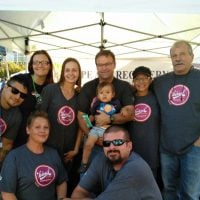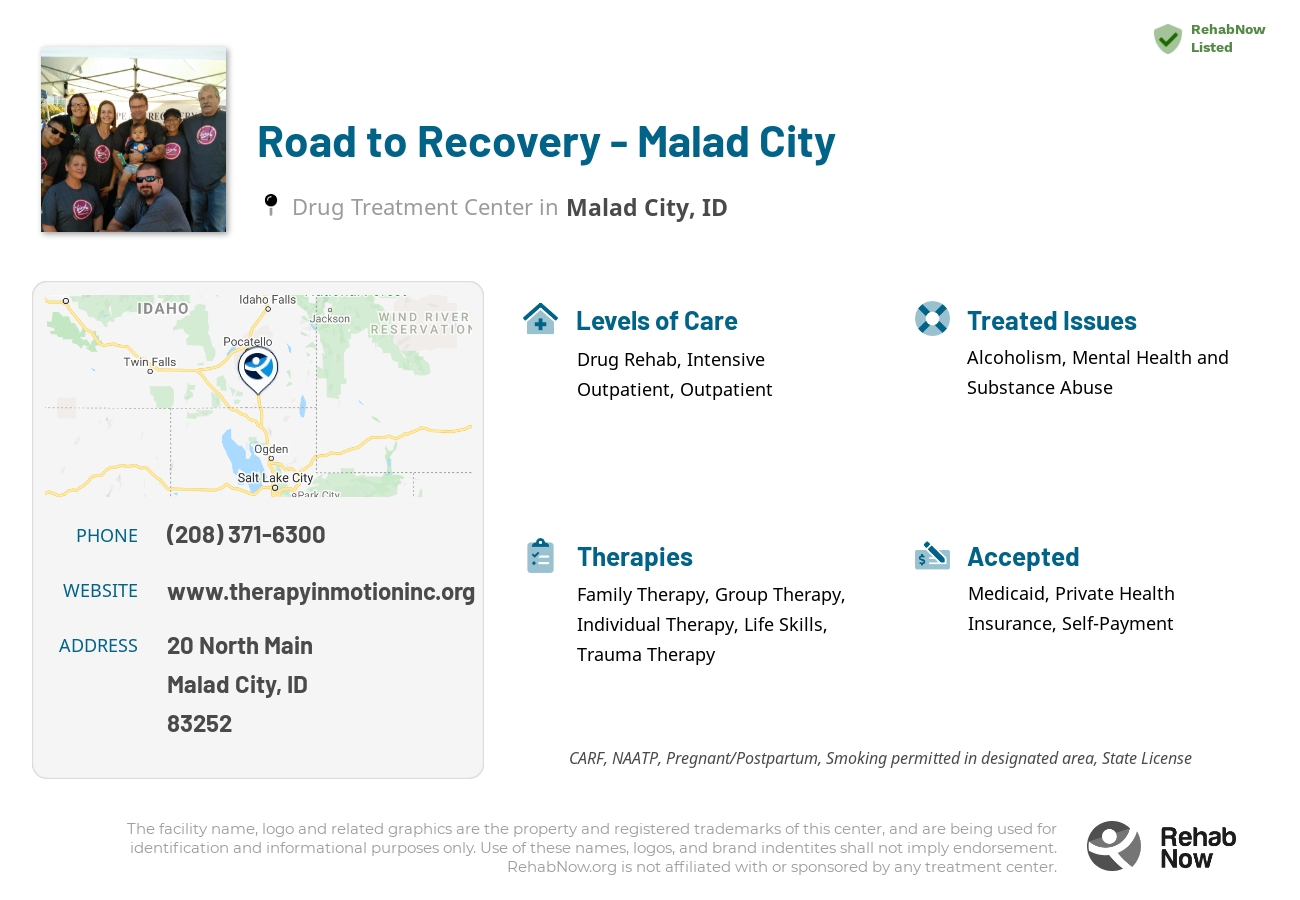Road to Recovery - Malad City
Drug Rehab Center in Malad City, Idaho
Road to Recovery - Malad City is an addiction treatment center in Idaho that offers residential, partial, and outpatient services, as well as detoxification, family counseling, therapy, relapse prevention education, and aftercare support, utilizing evidence-based practices and specialized training.
About Road to Recovery - Malad City in Idaho
Located in Malad City, Idaho, Road to Recovery – Malad City is an advanced addiction treatment facility that strives to provide quality and compassionate care to those suffering from substance and alcohol abuse. They offer a wide range of programs designed to meet the individual needs of their clients, including intensive outpatient and outpatient levels of care for specialized treatment of alcoholism, dual diagnosis, and drug addiction. All treatment plans are tailored to the individual by their experienced and certified staff and are based on an individual’s medical, psychological, and spiritual needs.
Road to Recovery – Malad City is a comprehensive facility that offers a wide range of services and programs to aid in the recovery process. Their evidence-based therapies and services include individual and group psychotherapy, medication management, relapse prevention, family education, and sober living services. Additionally, they are affiliated with HOPE and Recovery Resource Center, a certified and licensed nonprofit organization that provides additional support and resources to those in need. Road to Recovery – Malad City is accredited by the Joint Commission and accepts most private health insurance plans.
Genders
Ages
Modality
Additional
Conditions and Issues Treated
Levels of Care Offered
This center offers a variety of custom treatment tailored to individual recovery. Currently available are Drug Rehab, Intensive Outpatient, Outpatient, with additional therapies available as listed below.
Addicts who need help with their addiction can enroll in an intensive outpatient program (IOP). But the patient won’t live there during treatment.
IOP involves patients visiting a medical office building regularly for therapy and other services while continuing to live their lives.
IOP is a step up from drug or alcohol detox, but it’s still a phase of recovery, not the end goal. Patients in need of IOP have many options for rehab and treatment.
Outpatient treatment is considered the lower intensity level of addiction treatment. It’s ideal for early phase addiction or lower intensity addictions. It may include weekly sessions instead of daily. It may include weekly sessions instead of daily. Peer group support, 12-step programs, and individual counseling may still be involved but at a lesser frequency than an intensive outpatient program. It is a good choice for someone who doesn’t need to go through a medically supervised detox and who has a supportive home environment. It requires motivation and dedication to commit to the program without constant monitoring.
Therapies & Programs
Individual therapy involves one-on-one sessions between the patient and therapist. It provides patients with a safe environment to openly discuss personal and sensitive issues with the therapist. They find the therapist as someone they can trust. Individual therapy aims to identify the core issues that would have led the patient to substance abuse and address them effectively. The therapist can develop patient-specific customized solutions through individual therapy, which aids speedier recovery.
Family therapy is a group problem-solving that aims to improve communication and relationships between the addict, their family, and sometimes friends. The main goal of family therapy for drug addiction is to create an environment where communication can occur without judgment, hostility, or blame. The therapist is with the family as they learn to communicate differently, especially with the addict when s/he is using. The family can learn to reduce their enabling behavior or rally together and support each other during tough times.
An addict’s family can play a vital part in helping them to avoid relapse because they can spot the warning signs and help them get back on track before it becomes too much of a problem. Family therapy is one of the most effective ways to help addicts stay on the path to long-term sobriety. When a drug addict decides that they want to try and get sober, it takes the support of every person they love to succeed. It can be incredibly difficult for loved ones to watch an addict go through the pain and suffering of withdrawal, but by being there with them and supporting them, they can help to make sure that the addiction never returns.
Groups typically involve meetings with other recovering addicts who can relate to one another’s experiences. They might meet in person or online and typically focus on the process of staying sober rather than overcoming a specific addiction.
In these groups managed by Road to Recovery - Malad City, addicts can build a sense of community and develop strong emotional connections with others who understand what they are going through. These beneficial relationships can help addicts overcome their cravings and prevent relapse at any point during the recovery process.
In general, trauma therapy is a clinical process that helps individuals deal with mental stress often caused by traumatic events. The therapist helps the person identify, understand, and work through the problem. This is done with the help of talking about it in group or one-on-one counseling sessions. Therapists use relaxation, role-playing, art, and music to help the person open up about what is bothering them.
There are many different types of trauma therapists, such as psychiatric nurses and counselors. Not everyone is a good candidate for this type of therapy; it is generally reserved for people who have recently experienced a traumatic event and struggle to get over it. It is often done for children, teenage victims of sexual assault, and war veterans.
There is hope for people who are addicted to drugs and alcohol. Cognitive Behavioral Therapy (CBT) is the solution. CBT focuses on the underlying thoughts and behaviors that caused the addiction problem in the first place and may cause a relapse. This type of psychotherapy addresses negative feelings common in substance abuse disorders. It helps to change them by restructuring thought patterns. It’s about removing negative thoughts and providing long-term benefits while promoting self-awareness, self-control, and healthy ways to respond to negative thoughts. These sessions can be done by themselves or as part of combination therapy.
Since addiction is a chronic physical and mental illness, addicts need to learn as many life skills as possible. Many drug treatment centers offer life skills activities as part of their addiction recovery programs. Examples include cooking classes, employment training, resume writing seminars, parenting classes, and computer training. Life skills activities help addicts find employment, take care of their families, and give back to the community.
Payment Options Accepted
For specific insurance or payment methods please contact us.
Is your insurance accepted?
Ask an expert, call (888) 674-0062
HOPE AND RECOVERY RESOURCE CENTER Associated Centers
Discover treatment facilities under the same provider.
Learn More About HOPE AND RECOVERY RESOURCE CENTER Centers
Additional Details
Specifics, location, and helpful extra information.
Malad City, Idaho 83252 Phone Number(208) 371-6300 Meta DetailsUpdated November 25, 2023
Staff Verified
Road to Recovery - Malad City Patient Reviews
There are no reviews yet. Be the first one to write one.
Malad City, Idaho Addiction Information
In 2010, Idaho ranked amongst the top ten states of substance abuse in several categories. Alcohol dependence and abuse pose a major problem throughout the state, especially among minors between the ages of 12 and 17 years old. Opioids, like everywhere else in the nation, are also responsible for many substance abuse problems in the Gem State.
Treatment in Nearby Cities
- Garden City, ID (225.4 mi.)
- Rexburg, ID (115.5 mi.)
- Sugar City, ID (119.3 mi.)
- Gooding, ID (136.1 mi.)
- Plummer, ID (422.7 mi.)
Centers near Road to Recovery - Malad City
The facility name, logo and brand are the property and registered trademarks of Road to Recovery - Malad City, and are being used for identification and informational purposes only. Use of these names, logos and brands shall not imply endorsement. RehabNow.org is not affiliated with or sponsored by Road to Recovery - Malad City.


